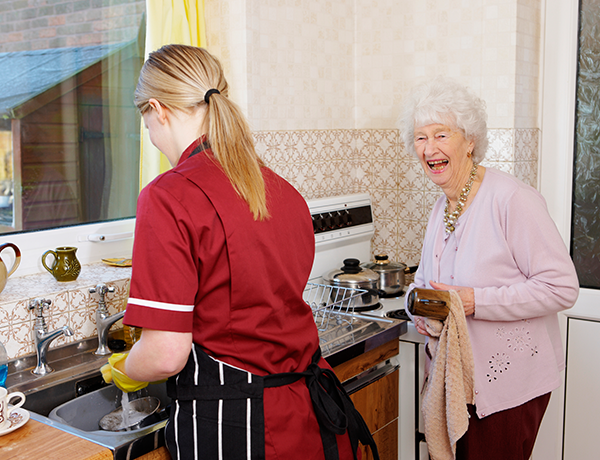 If your parent or loved one is aging in place, he or she may need help: perhaps one or two requests at first, but over time, your role as a caregiver can grow. The Family Caregiver Alliance reports that 43.5 million American adults provide caregiving to someone over the age of 50; 14.9 million of these are caring for a loved one with Alzheimer’s disease or dementia.
If your parent or loved one is aging in place, he or she may need help: perhaps one or two requests at first, but over time, your role as a caregiver can grow. The Family Caregiver Alliance reports that 43.5 million American adults provide caregiving to someone over the age of 50; 14.9 million of these are caring for a loved one with Alzheimer’s disease or dementia.
If you find yourself visiting more frequently and helping more, you may wonder whether it would be more convenient to bring your loved one home to live with you. This decision has a number of clear positives:
- Your commute time for caregiving would be eliminated.
- You’d be overseeing one household, instead of two.
- You’d have peace of mind, no longer worrying how your loved one is faring without you there.
But although moving Mom or Dad in might eliminate some immediate stressors, it can introduce others. Most importantly, it might not be the best option — for you or for your loved one. Consider the following as you decide whether this is the right move, and the right time.
‘Can I help enable my parent to stay at home instead?’
Is it absolutely necessary that your parent move right now? If not, you may be able to work on making changes to your loved one’s lifestyle and environment, allowing him or her to keep living independently at home. For example, if your parent is beginning to have difficulties completing some activities of daily living, look into adjustments or amendments that allow for better ease of use. Identifying and reducing fall risks in the home can also make moving around easier and safer.
Getting in-home help is another avenue, especially if difficulties are limited to certain times or activities. Tasks like meal preparation or vigorous cleaning might be hired out to a service provider or aide, and home health care can help with skilled management of chronic conditions, medications, and other aspects of overall wellness. Some home improvements and non-health services may incur added costs, but the overall expense is likely to be less than a new housing situation.
‘Is my home the best fit?’
However, if your parent is now or may soon be unable to continue aging in place, then the next decision to make is where to move. Bringing him or her home with you may seem like a natural step, but before making plans, there are some key factors to consider.
- Accessibility. Your home may not be adequately prepared for a senior with limited mobility and special safety concerns. To make your home safe and accessible may require investments of time and money to install adaptive equipment, especially in the bathroom and kitchen, and possibly make entryways and hallways wheelchair accessible. Carefully consider the adjustments required to make your home suitable for your loved one.
- Time, energy, and expertise. If your parent has special health needs or is living with a chronic disease, he or she may need help keeping up with daily routines — and some tasks may take some skill. With your loved one under your roof, it will fall to you and/or the rest of your family to fill that primary caregiving role. For many, this is a labor of love, but it can be taxing for all involved. As April is Stress Awareness Month, the possibility of caregiver fatigue is something to seriously deliberate.
For many, having a parent move in can be the best solution. Each situation is different, and only you can weigh the pros and cons. In-home private duty care, independent living, and assisted living are all additional options to consider before making a final decision.
Identifying the right place and time
Whether your parent does or does not need a new housing option right now, it’s always a good idea to begin an open dialogue about future plans and expectations. Talk candidly with your loved one about how he or she feels about moving away from home, where he or she would want to go if needed, and his or her ideal balance of independence and assistance. Talking early and often can make for more effective financial planning, and ensure that your loved one’s wishes are understood and honored to the best of your ability.
To determine whether you or your loved one might benefit from the in-home services offered by Residential Home Health, call (888)930-WELL (9355) to discuss your specific situation with a Home Care Specialist today, or click here to take our Home Care Assessment.
{{cta(‘985b89cb-4a6d-422d-aaca-7191dff19c69’)}}

